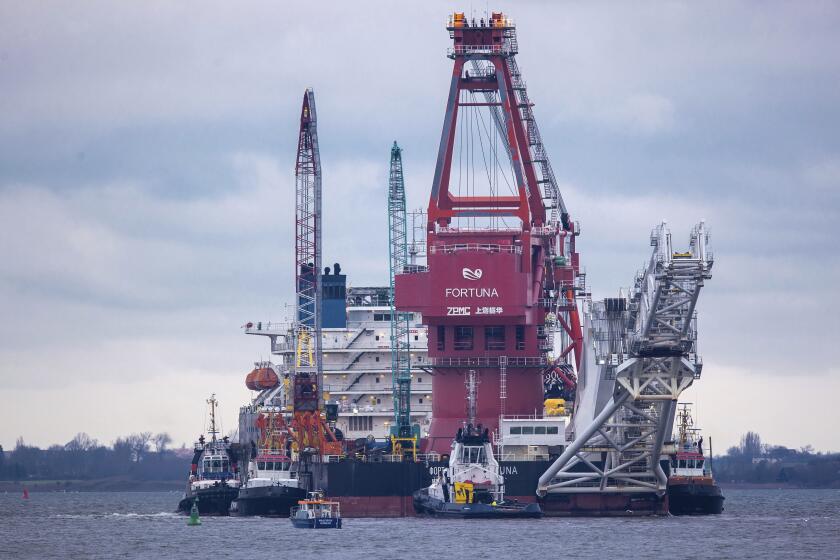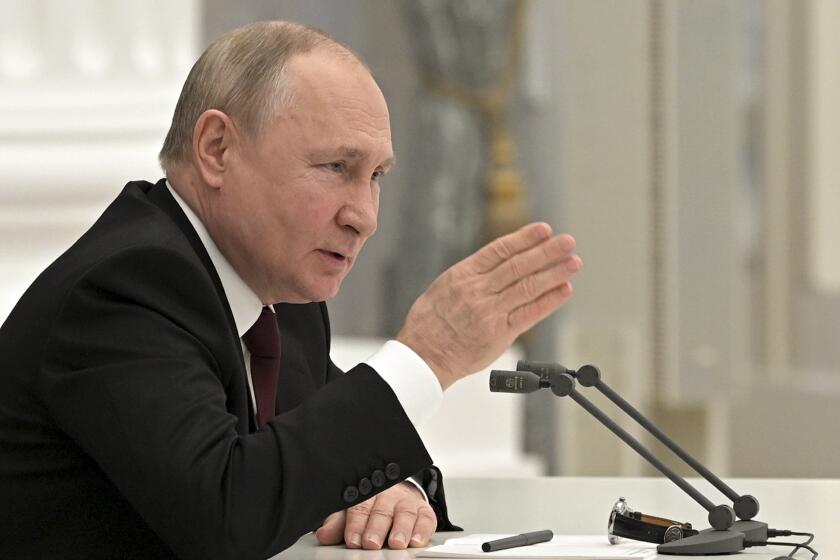Germany halts Nord Stream 2 pipeline as Europe responds to Russian escalation in Ukraine

Halting certification of the gas pipeline is the strongest economic action from the West so far in the escalating crisis over Ukraine.
BERLIN — German Chancellor Olaf Scholz said Tuesday that he has taken steps to halt the process of certifying the controversial Nord Stream 2 gas pipeline from Russia, as Britain and the European Union sharpened their responses as well to Russia’s escalation of the crisis over Ukraine.
Scholz told reporters in Berlin that his government was making the move regarding Nord Stream 2 after Russian President Vladimir Putin’s recognition Monday of the independence of two regions of eastern Ukraine held by pro-Moscow rebels. Germany’s response is the strongest economic action from the West so far.
The pipeline to bring natural gas from Russia to Germany has long been criticized by the U.S. and some European countries for potentially increasing Europe’s reliance on Russian energy supplies.
Scholz said his government had decided to “reassess” the certification of the pipeline, which hasn’t begun operating yet.
“That will certainly take time, if I may say so,” he said.
In London, British Prime Minister Boris Johnson said Tuesday that his government was slapping sanctions on five Russian banks and three wealthy individuals. Johnson told lawmakers that the sanctions would hit Rossiya Bank, IS Bank, General Bank, Promsvyazbank and the Black Sea Bank.
President Biden has targeted Russia’s Nord Stream 2 natural gas pipeline as he tries to deter the Kremlin from a potential invasion of Ukraine.
He said three Russian oligarchs with interests in energy and infrastructure — Gennady Timchenko, Boris Rotenberg and Igor Rotenberg — would have their assets in the U.K. frozen and be banned from traveling to the country.
All three men have already been sanctioned by the U.S.
Johnson accused Putin of “establishing the pretext for a full-scale offensive” against Ukraine and said “further powerful sanctions” would follow if that happened.
“This the first tranche, the first barrage of what we are prepared to do, and we hold further sanctions at readiness to be deployed,” Johnson said.
Russian President Putin seems willing to sacrifice so much to occupy Ukraine. It is part of his attempt to rebuild a Russian empire loyal, essentially, to him.
Meanwhile, top European Union officials say the EU is set to impose sanctions on several Russian officials as well as banks financing the Russian armed forces. The 27-nation bloc also intends to limit Moscow’s access to EU capital and financial markets.
A statement Tuesday said the move would “target those who were involved in the illegal decision” by Putin to recognize two rebel-held areas in eastern Ukraine as independent republics. The statement didn’t identify the targets.
EU Commission President Ursula von der Leyen and EU Council President Charles Michel said it would also “target trade from the two breakaway regions to and from the EU.”
They said the restrictive measures would aim to limit “the ability of the Russian state and government to access the EU’s capital and financial markets and services, to limit the financing of escalatory and aggressive policies.”
EU foreign ministers are meeting later Tuesday to discuss the measures. Von der Leyen and Michel said that “the EU has prepared and stands ready to adopt additional measures at a later stage if needed in the light of further developments.”
More to Read
Sign up for Essential California
The most important California stories and recommendations in your inbox every morning.
You may occasionally receive promotional content from the Los Angeles Times.












